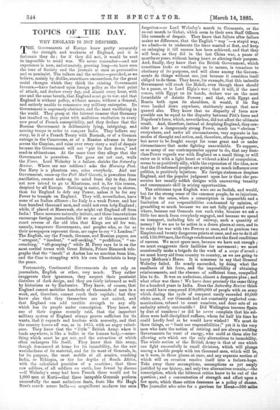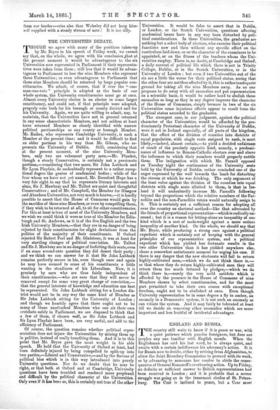TOPICS OF THE DAY.
WHY ENGLAND IS NOT DESPISED. WHY ENGLAND IS NOT DESPISED. THE Governments of Europe know pretty accurately the strength and weakness of England, and it is fortunate they do ; for if they did not, it would be next to impossible to avoid war. We never remember—and our experience is now, unfortunately, growing long—to have seen the tone of Society and the journals at once so provocative and so pessimist. The talkers and the writers—provoked, as we believe, mainly by dislike, sometimes unconscious, for the great social changes which they think the existing Government favours,—have fastened upon foreign policy as the best point of attack, and declare every day, and almost every hour, with one and the same breath, that England must go to war, and that England is without policy, without means, without a General, and entirely unable to commence any military enterprise. Its Government is supremely obstinate, and the most vacillating in the world. They grasp at the faintest rumour that Germany has insulted us, they point with malicious exultation to every new proof of French susceptibility, and they declare that the Russian Government is deliberately lying, intriguing, and moving troops in order to conquer India. They believe any story, be it of a French Treaty with Burmah, or of a German outrage in the Cameroons, or of a Russian advance in force across the Caspian, and raise over every story a wail of despair because the Government will not " put its foot down," and send-in ultimatums. At the same time they allege that the Government is powerless. The guns are not cast, wails the Times. Lord Wolseley is a failure, shrieks the Saturday Review. • Where are our soldiers ? asks the Morning Post. Our Navy is a phantom one, cries everybody. And our Government, sums-up the Pall .Mall Gazette, is powerless from tiracillation, cannot make-up its mind from day to day, does not now intend to go to Khartoum, and is, for this reason, despised by all Europe. Nothing is easier, they say in chorus, than for England to defy any Power, unless it be for any Power to trample on England. They will, nevertheless, have none ef an Italian alliance ; for Italy is a weak Power, and has four hundred thousand men, and could not even help England ; while, if placed at Massowah, she might cut England off from India ! These menaces naturally irritate, and these lamentations encourage foreign journalists, till we see at this moment the exact reverse of the old idea that Kings are all for war, namely, temperate Governments, and peoples who, as far as their newspapers represent them, are eager to cry " it Londres1" The English, say the French, German, and Russian papers, are " arrogant," " insolent," " self-seeking," " perfidious," " encroaching," " all-grasping ;" while M. Ferry says he is on the moat cordial terms with Great Britain, Prince Bismarck telegraphs that the "insult" at Ambas has no sanction from him, and the Czar is struggling with his own Chauvinists to keep the peace.
Fortunately, Continental Governments do not rely on journalists, English or other, very much. They rather exaggerate their ignorance, they suspect their pessimist diatribes of dark design, and they are fairly informed as well by historians as by Embassies. They know, of course, that England cannot mobilise hundreds of thousands of men in a week, and, therefore, cannot reach their capitals ; but they know also that they themselves are not united, and that England can add terrible strength to any ally which has its people under conscription. They know, as one of their organs recently 'said, that the imperfect military system of England always proves sufficient for its wants, that it expands and hardens with necessity, and that the country leaves-off war, as in 1855, with an angry reluctance. They know that the " little" British Army, when it lands anywhere, is like a bullet in the human body,—something which must be got out, and the extraction of which often endangers life itself. They know that this army, though denounced at home for its immobility, for the raw wretchedness of its material, and for its want of Generals, is, for its purpose, the most mobile of all armies, reaching India, or Ethiopia, or the far depths of South Africa, with the calculated precision of a machine ; that these raw soldiers, of all soldiers on earth, lose fewest by disease —if Wolseley's army had been French there would not be 1,000 men at Korti—that these incapable Generals perform successfully the most audacious feats, feats like Sir Hugh Rose's march across India—a magnificent madness too soon forgotten—or Lord Wolseley's march to Coomassie, or the recent march to Gubat, which seem to their own Staff Officers like counsels of despair. They know that failure after failure makes no difference, that the English " way "—a stupid way, we admit—is to underrate the force wanted at first, and keep on enlarging it till success has been achieved, and that they will bear, as they did in the last China war, a pause of months or years, without losing heart or altering their purpose. And, finally, they know that the British Government, which sometimes looks so vacillating as to means, is tenacious to obstinacy of its purposes, and will alone among the Governments do things without use, just because it considers itself obliged to do them. They know, for example, that this imbecile Government will crush the Mandi, even though there should be a pause, as in Lord Elgin's war ; that it will, if the need comes, with Egypt on its hands, declare war on the most formidable of Asiatic Powers ; and that, with Egypt and Russia both upon its shoulders, it would, if its flag were hauled down anywhere, stubbornly accept that new quarrel also. They know that no disparity of force now possible can be equal to the disparity between Pitt's force and Napoleon's force, which, nevertheless, did not affect the ultimate result. And, therefore, instead of despising England, they consider her a dangerously strong Power, much too " obvious " everywhere, and under all circumstances, very separate in her modes of thought and action, and, therefore, often disagreeable,. but never to be fought except for some great end or under circumstances that make fighting unavoidable. To suppose, as so many of our contemporaries appear to do, that any firstclass Power regards war with England as a small thing, or will enter on it with a light heart or without a kind of compulsion, seems to us positively silly, while the expression of the idea, now that the ill-informed peoples are gaining so much influence over politics, is positively injurious. No foreign statesman despises. England, and the popular judgment upon her is that she prosecutes her usually selfish designs with unswerving tenacity and consummate skill in seizing opportunities.
The criticisms upon English wars are as foolish, and would, but for the strong sense of the common people, be as injurious. What is the sense, when a conscription is impossible and a limitation of our responsibilities condemned by opinion, of grumbling so much because we are not fully prepared everywhere, because our Generals run such risks, because we ask a little too much from everybody engaged, and because we spend on transport, including bits of railway, such a quantity of money? If we are to be active in a dozen places at once, and to be ready for war with two Powers at once, and to garrison two Empires and twenty dangerous points at once, and are to do it all with 150,000 men, the things condemned are the fixed conditions of success. We must spare men, because we have not enough ; we must exaggerate their facilities for movement ; we must occasionally make a brigade do the work of a corps d'armie ; we must hurry aid from country to country, as we are going to hurry Methuen's Horse. It is nonsense to say that General Wolseley failed. He nearly succeeded, by doing what the smallness of his force, and the impossibility of obtaining reinforcements, and the absence of sufficient time, compelled him to do. It was an audacious, almost a desperate plan ; and what other was there ? We have done precisely the same thing for a hundred years in India. Does the Saturday Review think we could have conquered 250,000,000 of people with an army which during the cycle of conquest rarely exceeded 40,000 white men, if our Generals had not constantly neglected communications, refused to count numbers, and done acts of an audacity utterly unscientific ? Did Wellington traverse Spain by dint of numbers ? or did he never complain that his soldiers were half-disciplined ruffians, whom for half his time he could hardly feed as he would have wished ? We must do these things, or " limit our responsibilities ;" yet it is the very men who hate the notion of retiring, and are always scolding Governments for want of energy, who scold at them also for allowing acts which are the only alternatives to immobility. The whole notion of the British Army is that of one which can fight successfully in small divisions, which will plunge among a hostile people with ten thousand men, which will be, as it were, in three places at once, and any separate section of which will on occasion resolve itself into a forlorn-hope. Take away those assumptions, assumptions as yet amply justified by our history, and only two alternatives remain,—the conscription, which the bitterest critics know to be out of the question ; and a concentration of strength and effort upon a few spots, which those critics denounce as a policy of shame. The journalist who cries for a garrison for Herat-500 miles
from our border—cries also that Wolseley did not keep him self supplied with a steady stream of men It is too silly.



































 Previous page
Previous page